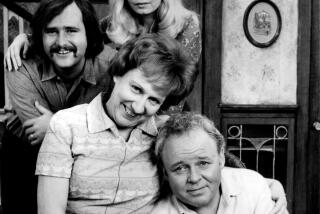‘Mad Men’ recap: The redemption of Don Draper
Apologies for the tardiness of this recap, but I’ve been listening to “Both Sides Now” on repeat and weeping bittersweet tears all morning, which can make it surprisingly difficult to type.
With that disclaimer out of the way, I’ll say this: Never underestimate “Mad Men’s” ability to surprise.
After a season that spanned the darkest and most turbulent year in recent American history, and at times played more like a psychological horror film than the brooding period drama we once knew, the series has done something thoroughly unexpected: It’s become hopeful.
PHOTOS: Fashion of ‘Mad Men’ Season 6
“In Care Of” is not only the most exquisitely poignant episode of “Mad Men” since “The Suitcase,” it’s also the most life-affirming the series has ever been, bringing the anxiety and menace of Season 6 to an end with a note of qualified but unmistakable optimism -- for Don and his children, but also for Joan, Roger, Peggy and Pete.
Who knew the image of a man standing with his kids in front of a rundown Victorian house on a trash-strewn street in an unnamed Pennsylvania town could be so moving?
One of the most frequent complaints leveled at this season of “Mad Men” is that Don’s struggles with women and drink had grown wearisome, and that the show itself was in a kind of narrative rut, mining the same thematic material with diminished results. While I agree to some extent with this criticism, it seems apparent that Matthew Weiner had this trajectory in mind all along: Drive us all to the brink of loathing Don, only to have our protagonist redeem himself in the most unexpected, heartrending way imaginable.
Just a week ago Don was a “monster,” rejected by both his one-time protégée and his only daughter. As “In Care Of” begins, things are even worse. He skips out on a meeting with Royal Hawaiian to go on yet another bender, one that lands him in jail for punching a minister (though, to be fair, that guy kind of deserved it). Returning home, he decides more or less on the spot that the only thing that will make him better is a move to California. Megan instantly agrees, thinking that a move out West will be a boon to her career and a balm for her ailing marriage.
RELATED: The women of ‘Mad Men’ talk Don, story rumors and the end
What we already know is that California is no longer the magical place it once was for Don, and his urge to start over is just a last-ditch effort to run from his demons. Given the crisis in Sally’s life -- she gets suspended from Miss Porter’s for buying beer with a fake ID -- fleeing to the other side of the country would be a terrible idea for all involved.
It takes a remarkable chain of events for him to come to this realization. First, Ted pleads to go to California in his place; like Don, he’s also trying to save his marriage. Don shuts him down, but Ted responds with weary compassion, urging him to have a drink before the Hershey’s pitch after noticing a tremor in his hand. The subliminal message is that Ted, as the child of an alcoholic, understands what’s really going on.
In the pitch, Don spins a fantastically dishonest yarn about mowing the lawn as a child in exchange for a Hershey bar from his father. The Hershey’s executives are completely wowed, and here we have the essential dilemma of “Mad Men”: The lies that have gotten Don everywhere professionally are also tearing him apart.
“Weren’t you a lucky little boy,” remarks one of the executives. Don, a smile on his face, looks up at Ted, and the lies come crashing down. In a scene that’s every bit as wrenching as last week’s St. Joseph’s pitch was excruciating, Don confesses the real reason why Hershey’s is, for him, “the currency of affection.” Growing up an orphan in a Pennsylvania whorehouse, young Dick Whitman read longingly about the industrial school Milton Hershey started for boys like him. He’d receive a Hershey’s bar as a reward from one of the girls at the brothel every time he was able to steal a dollar from the pockets of a john.
PHOTOS: ‘Mad Men’ Season 6 premiere
“I’d eat it, alone in my room, with great ceremony, feeling like a normal kid,” he says. “It was the only sweet thing in my life.”
Naturally, the confession leaves everyone stunned. Don leaves the office, almost immediately a changed person, telling Ted he can go to California and even calling Dawn “sweetheart.” If the agency partners hadn’t pulled a Freddy Rumsen on him first, forcing him to take an indefinite leave of absence, it almost seems like Don would have walked away from the corrupt business on his own.
Their decision hurts, of course, especially given how eagerly his one-time nemesis Duck Phillips is looking to fill the vacancy, but it expedites what I can only hope will be a much-needed healing process for Don. Left jobless and with his marriage on the rocks, all Don has left are his children. On Thanksgiving Day, he drives them to his grim Pennsylvania hometown and tells them the truth about his past.
I’ve watched that last scene about six times now, and each time it grows more affecting, particularly the look on Sally’s face, at once profoundly confused and totally comprehending. (There was a lot of talk on Twitter Sunday night that it’s time for Jon Hamm to win an Emmy. While I thoroughly agree, the expression on Kiernan Shipka’s face alone is worthy of a thousand Emmys.) With Don filmed from a low angle in his fedora, it calls to mind the closing image of “The Gypsy and the Hobo,” the stunning Season 3 episode in which Betty learned the truth about Dick Whitman -- hardly a coincidence, I think.
PHOTOS: The women of ‘Mad Men’
Of course Don’s newfound honesty doesn’t mean his demons have been purged forever. We’ve seen him confess in the past -- first to Betty, then Faye, and finally to Megan -- only to succumb once again to familiar habits. If Don is ever able to fully exorcise the past, coming clean to his children seems like an essential step in that process. As Sally herself told Don, the most terrifying thing about Grandma Ida was the realization that she didn’t know a thing about her father. Now, at last, she does.
For most of “Mad Men’s” run, the Draper children have been something of an afterthought to the various mistreated women in Don’s life, their emotional wounds less immediately visible than the ones inflicted on Betty or Megan. But this season the issue of their well-being (especially Sally’s) has moved to the forefront. As Megan puts it, “I used to feel pity for them but now I realize we’re all in the same boat.”
Don isn’t the only one taking steps toward intergenerational healing in the finale. Joan invites Roger, rejected by his money-grubbing daughter, over for Thanksgiving dinner so he can bond with Kevin. And Pete decides, per Trudy’s advice, to view his mother’s suspicious death as a liberation from the burden of her expectations.
One of Don’s greatest powers is his ability to shape others in his image; between Sally, Peggy, Pete and Bob, there are mini-Dons everywhere on this show. “In Care Of” suggests the opposite is also true: that Don’s redemption extends to those around him.
The most obvious example of this is Ted, who is saved by Don from becoming Don. After Peggy and Ted finally give into temptation, thanks to a fetching dress and some Chanel No. 5, yet another “Mad Men” breakup seems imminent -- at least until Ted returns home and slips into bed with his wife. “Sweetheart, you’re working too hard,” she says lovingly, resting her head on his chest. Ted stares at the ceiling, a pained look on his face. The message is clear: A divorce is easier said than done, especially given that his marriage seems like a relatively happy one.
We’ve seen Don in a virtually identical tableau dozens of times on “Mad Men,” right down to the white undershirt. The message? If Ted doesn’t take some drastic measures, he’ll wind up like Don. His eventual decision to allow Ted to “put 3,000 miles” between himself and Peggy is steeped in irony, and maybe even self-sacrifice: Don further jeopardizes his already tenuous marriage in order to save Ted’s.
As viewers, our emotions are nearly as mixed as Ted’s. We all want Peggy to be with someone like him, who not only respects her ambition but loves her for it. But if he abandons his wife and kids, then Ted will sacrifice some of the fundamental decency that makes him so appealing.
When Ted finally goes to Peggy to tell her he’s not leaving his wife, that instead he’s moving to the other end of the country, it’s impossible not to sympathize with her anger. It’s equally impossible not to feel for Ted, who says he has to hold on to his family “or I’ll get lost in the chaos.” The line sums up so much about this season and its turbulent historical backdrop. Ted copes with the upheaval in his life -- and permeating every aspect of society -- by tenaciously clinging to his wife and children. Leaving them has never been easier, which is why he refuses to do it.
And let’s not kid ourselves; Peggy also has plenty to look forward to. She winds down the season wearing a fetching little plaid pantsuit while flirting with Stan and, most critically, looking rather at home in Don Draper’s empty chair. I’ll drink to that.
Even Betty, in her brief appearance in this episode, is cast in a new, redemptive light. In an unusually emotional scene, she calls Don with the news of Sally’s suspension, blaming the incident on her own shortcomings as a parent. “The good is not beating the bad,” she says.
For once on “Mad Men,” the opposite appears to be true and I, for one, welcome it.
Stray thoughts:
--We end the season with so many unanswered questions: Will Megan leave Don? Who, exactly, is going to California? Did Joan ever get a call back from Avon? And just what is the deal with her and Bob Benson?
--Megan: still not dead.
--Small but significant detail: Ted is not present at the partners’ meeting when Don learns he’s been suspended.
--Pete in California should be hilarious -- especially the driving.
--Is anyone else already feeling terribly sad that we only have 13 “Mad Men” episodes left?
--Weiner chose to use the version of “Both Sides Now” by Judy Collins, not the original by Joni Mitchell, as I first thought, which somehow seems appropriate for this episode.
-- I’m hoping that last scene with Peggy sitting in Don’s office and flirting with Stan is a harbinger of things to come in every way. Also: that plaid pantsuit! Wow!
-- I still get a little verklempt every time Don calls Betty “Birdie.”
--As someone who grew up in a Pennsylvania steel town, I am very curious about where exactly little Dick Whitman hails from. Presumably it’s somewhere between New York City and Hershey.
--Joan’s Thanksgiving dinner is a brief but delightful scene. Roger shows up carrying a case of Ocean Spray cranberry sauce (“We couldn’t return it”) to find Bob Benson wearing a woman’s apron, carving the turkey and cracking jokes about Gail’s hair. Please, never let this show end.
--Don’s very concise take on 1968: “Jesus had a bad year.”
--Last but not least, who’s got season 7 predictions?
ALSO:
Making sure ‘Mad Men’ is ‘60s authentic‘Mad Men’ creator: Don’t hate Don Draper
‘Mad Men’ recap: Don Draper, man or monster?
More to Read
The complete guide to home viewing
Get Screen Gab for everything about the TV shows and streaming movies everyone’s talking about.
You may occasionally receive promotional content from the Los Angeles Times.






